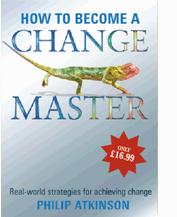'BrandYou' - Accelerate Self Confidence, Destroy Self Limits

Here’s how Philip Atkinson used a variety of behaviourial science techniques, together with CBT, to bring about change in a number of organizations.
This is a theme that has recurred in many of Philip’s interventions in organizations including Telecoms, Banks, Insurance & Financial Services, Accountancy and Legal Firms, Manufacturing and Contact Centers. Philip has also used the concept of ‘Brand You’ to enable internal change agents such as L&D, Project, IT, Internal Audit, Risk & Compliance and HR managers to be more effective when driving needed changes within their organizations.
Birth of the Concept
The concept of ‘Brand You’ is not new, but it is not a theme that many UK businesses have endorsed or applied – relying more on large corporate change initiatives to bring about improvement. Philip was asked to design a series of workshops by a large Telecoms company designed to improve the ability of Internal Auditors to influence their clients (managers within the business) to implement the recommendations inherent within their audit reports.
The Driver behind the Change
The driver behind this need was evidence that many recommendations made within internal audit reports were ‘accepted’ by the business managers but often never implemented. Consequently, when further audits were undertaken, it was clear that previous findings and recommendations has been ignored. The success of the internal audit team was in question because business managers frequently ignored the recommendations of any report and continued working in the same old way.
This IA Unit employed over 200 staff and the unit was tasked WITH increasing their involvement in the business, thus reducing the unnecessary cost associated with employing external auditors.
‘Brand You’ as a Concept
It was clear the technical capability of staff was high but what required some thought and effort was their ability to influence their clients. No amount of ‘up-skilling’ in technical expertise would deliver the results required. Discussion focused on the individual making a difference and hence the term ‘Brand You’ evolved.
Philip ensured that ‘Brand You’ is authentic and focuses on the individual, rather than ‘one best way’. After any interaction each of us leaves behind our own distinct signature but often we are unaware and unconscious of the impact that we can have on others. Philip’s workshops were designed to focus entirely on identifying the distinctive strengths that made each person important, and examined key strategies that would enable them to be more effective when selling their ideas, concepts and approaches to others.
Managing Objections before they arise
Essential to this process was to consult various sales models and the components that encapsulated best practice. It comes as no surprise to managers that flexibility and adaptation to the other person’s objections was critical. Central to any sales or influencing model is anticipating the likely objections that others have to our proposals and ensuring that we can counter these in advance of them arising. We use the term inoculation against rejection. So as well as working through the various personal sales and influencing models Philip also focused on ‘taking a good look in the mirror’ and exploring what makes for a personal style of influencing.
Destroying Self Limiting Beliefs & Promoting Self Confidence
Philip used a variant of Robert Dilts Logical Levels to focus on the role of Identity, and how one continually shapes this shifting personal Belief System and how this is in turn reflected in our Personal Values. Rather than working solely on Skills and Behaviours Philip focused on Values and Beliefs and used a variety of models including Myers Briggs Type Indicator to get a flavor of the engine that powers ‘Brand You’.
Psychometrics & Self Awareness
Philip further simplified the MBTI model into a four quadrant model of Regulator, Visionary, Analyst and Facilitator and started exploring the stances that people take if they happen to fall within these areas. The important point is that by understanding the core personality drivers behind the person we are trying to influence, the stronger our repertoire of tools and skills becomes in enabling us to persuade, negotiate and influence others.
Role Plays
The critical component in many Workshops is the use of Role Plays – that is, learning by doing. For instance in a recent intervention with a major Insurance Company, Philip designed role plays for Risk Managers. Here Philip took various ‘difficult situations’ when working with very senior staff of the business and ran all managers through a series of role-plays over two days. Further, they had input in the following areas that enabled them to develop their own strategies.
Typical Content of Workshops
Rehearsal
One of Philip’s key strengths is his ability to support managers who lack the confidence to try new approaches, such as being more assertive. He believes firmly in rehearsal. No, not learning a set phrase or rote memorization but, rather, adapting techniques to fit naturally and authentically with one’s own style. He says “You should never let your first rehearsal be the actual event’. You must have practiced the approach and strategies a number of times to examine how you can deliver more effectively to create win-win solutions.
Summary - Brand You Today
Philip has developed the 'Brand You' concept to include Facilitating Large Scale Change, Brand You and Strategic Interviewing, Managing Resistance to Change and he runs a series of workshops for Internal Audit Staff, Quality Managers, Risk Consultants, Sales Executives and Account Managers, Accountants, Engineers and Lawyers.
This is an opportunity for professional people to equip themselves with the interpersonal competence to take their personal performance to the next level.
In the last few years he has presented on the ‘Brand You’ concept at Conferences and at Brand meetings of the Chartered Institutes of Marketing, Internal Audit, Banking and Personnel Development and has speaking engagements. It is clear that the concept is well accepted and is currently focused on sessions geared for the Private and Public Sector .
For more information contact Philip direct or use our contact form
This is a theme that has recurred in many of Philip’s interventions in organizations including Telecoms, Banks, Insurance & Financial Services, Accountancy and Legal Firms, Manufacturing and Contact Centers. Philip has also used the concept of ‘Brand You’ to enable internal change agents such as L&D, Project, IT, Internal Audit, Risk & Compliance and HR managers to be more effective when driving needed changes within their organizations.
Birth of the Concept
The concept of ‘Brand You’ is not new, but it is not a theme that many UK businesses have endorsed or applied – relying more on large corporate change initiatives to bring about improvement. Philip was asked to design a series of workshops by a large Telecoms company designed to improve the ability of Internal Auditors to influence their clients (managers within the business) to implement the recommendations inherent within their audit reports.
The Driver behind the Change
The driver behind this need was evidence that many recommendations made within internal audit reports were ‘accepted’ by the business managers but often never implemented. Consequently, when further audits were undertaken, it was clear that previous findings and recommendations has been ignored. The success of the internal audit team was in question because business managers frequently ignored the recommendations of any report and continued working in the same old way.
This IA Unit employed over 200 staff and the unit was tasked WITH increasing their involvement in the business, thus reducing the unnecessary cost associated with employing external auditors.
‘Brand You’ as a Concept
It was clear the technical capability of staff was high but what required some thought and effort was their ability to influence their clients. No amount of ‘up-skilling’ in technical expertise would deliver the results required. Discussion focused on the individual making a difference and hence the term ‘Brand You’ evolved.
Philip ensured that ‘Brand You’ is authentic and focuses on the individual, rather than ‘one best way’. After any interaction each of us leaves behind our own distinct signature but often we are unaware and unconscious of the impact that we can have on others. Philip’s workshops were designed to focus entirely on identifying the distinctive strengths that made each person important, and examined key strategies that would enable them to be more effective when selling their ideas, concepts and approaches to others.
Managing Objections before they arise
Essential to this process was to consult various sales models and the components that encapsulated best practice. It comes as no surprise to managers that flexibility and adaptation to the other person’s objections was critical. Central to any sales or influencing model is anticipating the likely objections that others have to our proposals and ensuring that we can counter these in advance of them arising. We use the term inoculation against rejection. So as well as working through the various personal sales and influencing models Philip also focused on ‘taking a good look in the mirror’ and exploring what makes for a personal style of influencing.
Destroying Self Limiting Beliefs & Promoting Self Confidence
Philip used a variant of Robert Dilts Logical Levels to focus on the role of Identity, and how one continually shapes this shifting personal Belief System and how this is in turn reflected in our Personal Values. Rather than working solely on Skills and Behaviours Philip focused on Values and Beliefs and used a variety of models including Myers Briggs Type Indicator to get a flavor of the engine that powers ‘Brand You’.
Psychometrics & Self Awareness
Philip further simplified the MBTI model into a four quadrant model of Regulator, Visionary, Analyst and Facilitator and started exploring the stances that people take if they happen to fall within these areas. The important point is that by understanding the core personality drivers behind the person we are trying to influence, the stronger our repertoire of tools and skills becomes in enabling us to persuade, negotiate and influence others.
Role Plays
The critical component in many Workshops is the use of Role Plays – that is, learning by doing. For instance in a recent intervention with a major Insurance Company, Philip designed role plays for Risk Managers. Here Philip took various ‘difficult situations’ when working with very senior staff of the business and ran all managers through a series of role-plays over two days. Further, they had input in the following areas that enabled them to develop their own strategies.
Typical Content of Workshops
- Self-disclosure and Rapport Building
- Developing your self confidence and self esteem
- Accessing your personal Authenticity, and developing a win-win attitude at all times
- Assessing your preferred process of Influence and setting a ‘Yes-Yes’ frame
- Shaping Rapport with others in the change team
- Understanding how to drive the Acceptance of Change
- Utilizing selling Benefits & Features to a win-win advantage for improvement
- Rehearsing 7 Assertive techniques to make your point
- Practicing Listening skills on a variety of levels
- Facilitating the soft skills of Power and Influence
- Developing a confident Negotiating style
- Giving Bad News effectively
- Bringing things back from the edge – the de-escalation of conflict
- Using solution-based questioning to create win-win solutions
- Utilizing Jungian analysis of personality to build rapport and diminish conflict
- Handling Personality Objections
- Identifying Motivational drivers in others
- Using the four quadrant Personality Tool
- Analyzing Conscious and Unconscious Behaviour
Rehearsal
One of Philip’s key strengths is his ability to support managers who lack the confidence to try new approaches, such as being more assertive. He believes firmly in rehearsal. No, not learning a set phrase or rote memorization but, rather, adapting techniques to fit naturally and authentically with one’s own style. He says “You should never let your first rehearsal be the actual event’. You must have practiced the approach and strategies a number of times to examine how you can deliver more effectively to create win-win solutions.
Summary - Brand You Today
Philip has developed the 'Brand You' concept to include Facilitating Large Scale Change, Brand You and Strategic Interviewing, Managing Resistance to Change and he runs a series of workshops for Internal Audit Staff, Quality Managers, Risk Consultants, Sales Executives and Account Managers, Accountants, Engineers and Lawyers.
This is an opportunity for professional people to equip themselves with the interpersonal competence to take their personal performance to the next level.
In the last few years he has presented on the ‘Brand You’ concept at Conferences and at Brand meetings of the Chartered Institutes of Marketing, Internal Audit, Banking and Personnel Development and has speaking engagements. It is clear that the concept is well accepted and is currently focused on sessions geared for the Private and Public Sector .
For more information contact Philip direct or use our contact form

